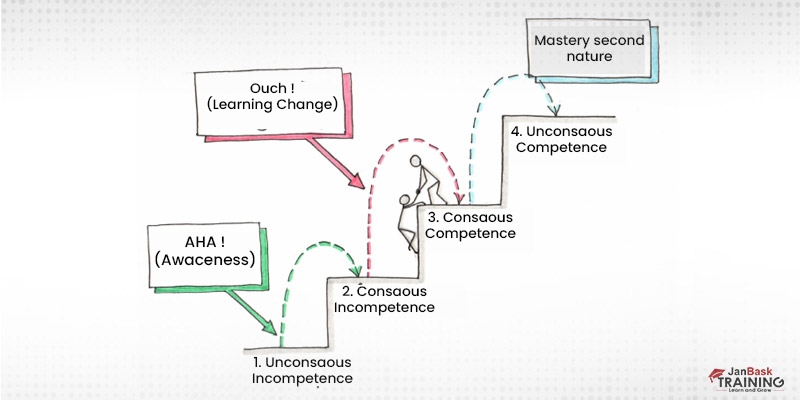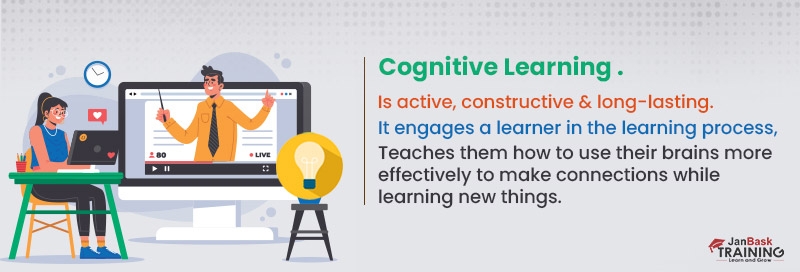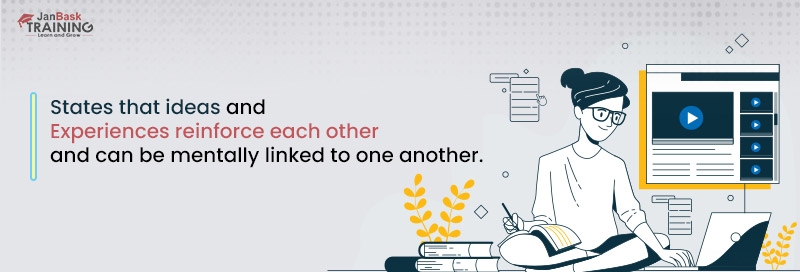Grab Deal : Flat 30% off on live classes + 2 free self-paced courses - SCHEDULE CALL

Do you want to learn a professional new skill or talent but feel demotivated?.
Do you often feel distracted or less confident of getting started with any new skill to either amp up your education or professional journey?
Well, you are not alone. Most people find it difficult to start their learning journey or continuing adding to their learning curve either due to time crunch or due to lacking motivation or correct path to get started.
What if we can turn you into a super-learner? How? By telling you incredible stages of learning that can help you understand how you grasp any knowledge, retain it, subside any challenges, and finally become a master in it.
By learning both the 3 and 4 stages of learning, you will know how your brain captures & learns any information you put in front of it. If you would start applying & learning according to these stages of learning, you would experience:
Eventually, these stages will help build your knowledge & outlook towards any skill and you will soon reach a point where you will be able to master the skill and teach others for their benefit.
So if you are interested in learning the stages of learning & how to apply them, jump right in!
There are mainly two popular stages of learning: 3 stages of learning & 4 stages of learning, we will talk about both.
This is what the 3 stages of learning cognitive, associative, and autonomous means:
|
Types |
Stages |
What Do They Infer? |
|
3 Stages of Learning |
|
|
This is what the 4 stages of learning mean!
|
Types |
Stages |
What Do They Infer |
|
4 Stages of Learning |
|
|
Here are the two popular stages of learning with their complete understanding like what they mean, infer, how they help a learner, their feeling in each process, and what is the role of the instructor during each stage.
We don’t realize it but while learning any new skill or technology, we are applying subconscious efforts or stages. There are 3 stages of learning cognitive, associative, and autonomous which everyone covers with different approaches and in different timelines. Some cover all these 3 stages, while some complete either one or just two of them.

This is the first stage where learners while learning new skills or taking in any new information, tries to connect with it by observing, processing, and analyzing it. They make connections with that skill to be grasped, based on what they understand by it. They may have some subconscious or conscious knowledge about that and try to relate with that.
This stage promotes long-term learning, problem-solving skills, and comprehension of things. In this stage, the brain thinks, knows, tries to remember, judges a situation or skill.
Example of Stages of Learning Cognitive:

Associative learning is when a mind is prepared to learn and give modified responses whenever a stimulus is offered. In this learning stage, the new and old information is linked together mentally. The ideas and experiences reinforce each other.
Associative learning reinforces optimal behavior and emphasizes the learnings from the environment. It conditions the brain to make decisions based on expected outcomes & expect to have consequences. This learning stage helps students connect with the information more deeply & recall that information with great accuracy.
Example of Associative Learning:
Supposedly, when you put your hand on a hot stove and feel pain thereafter. There is a stimulus from which you are associating a hot stove equivalent to pain. Thereafter, your brain learns & gets conditioned to not put your hand on the hot stove ever again.
In this learning stage, you learn from the unexpected outcomes of certain situations and condition your mind accordingly.

At this stage, learners can learn any knowledge or skill through independent efforts and the teachers or trainers here are just facilitators and not instructors. This stage is also termed “self-directed learning”. The learners are able to control or regulate their own learning activity and process.
At this final stage of learning, the learners have enough knowledge, understanding to power their learning process. They are now able to create their own plan, path, strategies to achieve their learning targets well off.
They are aware of their learning style and have the freedom to execute their own learning path and can learn as per their own will.
Example of Autonomous Learning:
Learners know they need to learn, let’s say Azure cloud computing, and have the vision to prepare their learning strategies like joining a training platform, collecting the study resources, and preparing for the certification.
Here they are self-aware how to go about learning a skill that they should.
The learning process can seem to be overwhelming as looming negative feelings are bound to take place. Negative feelings occur when you make mistakes, have no clue of how to start learning and fail to conclude the best learning journey.
Mistakes or errors are part and parcel of life. But if you know how your brain learns or imbibes the knowledge, concept, or any skill, you will be more focused on learning and improving your ways and might bid adieu to the scope of any mistake.
Here are Abraham Maslow’s 4 stages of learning, a conceptual framework telling us how we learn everything.
|
4 Stages of Learning |
What Each Stage Infers |
|
Stage 1 - Unconscious Incompetence |
“I don’t know that I don’t know” |
|
Stage 2 - Conscious Incompetence |
“We know that we don’t know” (and want to work & improve) |
|
Step 3 - Conscious Competence |
“We know how to do it but have to concentrate” |
|
Step 4 - Unconscious Competence |
“We can do it with ease & habitually” |
This is the first stage where the learner knows nothing. They are incompetent of certain skills or knowledge and they don’t know they are incompetent of that certain skill or knowledge. This stage can be called a stage of ignorance where the learner doesn't know what they don’t know.
Examples of Unconscious Incompetence
Role of Educator or Instructor at this stage of learning:
The learners may feel confused, frustrated when they don’t know what they don’t know. Here the role of educators is to introduce the topic or skill to the learner, create a spark about it and motivate them to learn it.
This stage is a rude awakening where the learner knows he doesn't know that skill or concept. He has self-awareness about his inabilities & incompetences. And this stage can be stated as a stage of motivation, where they fail at something and they want to go about learning it.
Examples of Conscious Incompetence
Role of Instructor at this stage of learning:
The learner at this stage is now aware of his inadequacy, the frustration of now knowing has built up, has the motivation to learn a new skill, in this case, the role of trainer or educator is to teach the learner that skill until they excel it or do it on their own. They have to place a great deal of education and modeling to help students or anyone get past their inquisitiveness and reach a state of perfectly doing or acing that skill.
When the learner has put all efforts to learn the relevant skill and is able to do it without anyone’s supervision like of teacher’s or instructor’s. He/she now just need to keep practicing it to keep it stored in their reflective memory, make it habitual, and avoid making any mistakes.
When you as a learner carefully start understanding & implementing that skill and keywords like “practice, implement, and repetition are at the frontline until the finesse takes its course.
Examples of Conscious Competence
Role of Instructor at this stage of learning:
The learner at this stage is feeling confident, hopeful, determined, the educator needs to let them have ample room to polish their newly-learned skill by practicing. Malcolm Gladwell argues that to be an expert, you need at least 1000 hours of practice.
When the learner reaches this last stage of “unconscious competence”, he/she knows they can carry and implement that skill without much effort. They have gained mastery over it. They are in that zone where they don’t want to stop, think, ponder about how to go about performing that skill.
This unconscious knowledge of the learner is called “tacit knowledge”, where they are not able to explain “how they are able to do that skill”, well “they just do it”.
Examples of Unconscious Competence
Role of Instructor at this stage of learning:
At this stage, the learner is confident and determined and the role of the educator is completely wiped out as the learner is no longer a learner, they have become masters of their skill.
As an extension of these 4 stages of learning, there is a 5th stage of learning too.
This stage has been recently added by educational psychologists. As the learner has become a master, he/she now is able to walk into the shoes of a trainer or educator and help others acquire knowledge (that he/she did).
In this “conscious unconscious competence” stage, the learner is able to dissect, understand, and become conscious of how they are able to do a task or perform that learned skill.
They finally are now able to predict how they are able to do any skill or craft so well off and have the ability to draw strategies that can help teach others.
Examples of Unconscious Conscious Competence
Role of educator in this stage of learner:
Now the learners become the teachers and have the obligation to help others imbibe the skill.
Biggest Question - Are there 4 stages of learning or 5?
The first 4 stages of learning were introduced by Martin Broadwell in 1969, which were also called “stages of teaching”. The fifth level was introduced mutually by the modern philosophers & educators for the new apprentices who have moved from the learning stage and now are able to teach others to help in their journey.
Now you know what are the 3 & 4 stages of learning, here are the 4 ways through which you can implement these stages in reality, and learn anything you want to, in any timeline you prefer.
Name any one skill, technology, knowledge, a talent that you want to learn and master over time. It could be any academic skill, job-related skill, or motor skill.
You can think of learning any career-related skills, say Salesforce. Or it could be how to ride a bike or anything you realized lately that you need to learn.
Go ahead and dissect the skill or knowledge you are particularly learning into sub-skills. Supposedly if you are learning AWS technology, there are several components in this vast technology like the AWS configuration, services, networking, monitoring and so much more.
Similarly, if you are learning to drive, there are several sub-skills involved in driving a car too like - clutch control, gear changes, how to stop or reverse a car, brake, managing speed limit, driving proficiently, and more.
Knowing the sub-skills beforehand will help you proceed with the learning process more clearly & better.
In this stage, you need to identify your own abilities and see the gaps where you lack. In this step, you have to bypass the limited thoughts where you compare yourself to others & are often deviated from the learning journey.
While learning the skill, understand what you already know about it. For example, take the case of driving skills, analyze what you already know about these skills. Like you must be knowing the basic road safety, traffic rules, or other prerequisites to driving. Analyzing and exploring your current knowledge inventory will help build up your confidence level.
The learning process & activities can be overwhelming or not possible to learn through self. Like if you don’t know how to drive, you cannot self-learn it. You either need a motor school or someone who knows driving to teach you.
Likewise, if you have decided to learn any professional skill like Java programming, or Python programming, you would need to consult an accredited training institute with qualified instructors.
Whatever skill you decide to learn, find a training platform equivalent to it and allow them to shape and model your learning curve for future jobs or any spheres of life.
At JanBask, our trainers are familiar with all the learning stages & have course curriculum modeled in such a way that your learning interest is nurtured and fulfilled in the best way.
If you were previously struggling to learn a new skill or craft, the above-proposed stages of learning by different psychologists/theorists can help you learn & process any information with speed & great concentration.
The 3 and 4 stages of learning we just discussed are helpful to expand your outlook, improve your memory, boost your confidence, and speed up your learning if applied correctly. The steps we shared to apply these learning stages are also full-proof if you are determined to learn and master any new language, technology to streamline your learning for college grades or for uplifting your career trajectory.
Do you know learning is an endless event in life? Those who learn continuously, life belongs to them! If you are inspired to learn new trending skills to start or upgrade your career, our platform can help you explore tons of career options with their effective training. We help you learn and grow by nurturing you through each of the stages of learning discussed above.
Don’t believe it, why don’t you take our free demo class on IT & Management Skills and then decide?
Your Next Read:
Do you think there are other stages of learning? Now you know what are the top stages of learning, which skill you would want to learn up next? Tell us in the comment section below!
 Pinterest
Pinterest
 Email
Email
With fact-finding market research & solicitous words, Nandita helps our digital learners globally navigate their way to profound career possibilities in IT and Management.

Cyber Security

QA

Salesforce

Business Analyst

MS SQL Server

Data Science

DevOps

Hadoop

Python

Artificial Intelligence

Machine Learning

Tableau
Search Posts
Related Posts
Receive Latest Materials and Offers on Worth To Visit Course
Interviews
Aidan Johnson
This is my first read after a long time, Just awesome!
JanbaskTraining
Hello, JanBask Training offers online training to nurture your skills and make you ready for an amazing career run. Please write to us in detail at help@janbasktraining.com. Thanks!
Louis Anderson
According to me, learning is a part of everyday life till the day we are alive.
JanbaskTraining
Thank you so much for your comment, we appreciate your time. Keep coming back for more informative insights. Cheers :)
Omar Moore
One of the best blogs I found on learning, love it!
JanbaskTraining
Hi, Thank you for reaching out to us with your query. Drop us your email id here and we will get back to you shortly!
Nash Martin
I love motivational blogs, this blog is motivational as well as informative. Don’t miss to read it.
JanbaskTraining
Hello, JanBask Training offers online training to nurture your skills and make you ready for an amazing career run. Please write to us in detail at help@janbasktraining.com. Thanks!
Phoenix Robinson
Learning is my passion and these are the blogs that motivate me. Cool one!
JanbaskTraining
Thank you so much for your comment, we appreciate your time. Keep coming back for more such informative insights. Cheers :)
Jax Williams
I love reading, And then my friend shared the link to this article. The article was amazing.
JanbaskTraining
Hello, JanBask Training offers online training to nurture your skills and make you ready for an amazing career run. Please write to us in detail at help@janbasktraining.com. Thanks!
Caden Thomas
I am really impressed with the information included in this article.
JanbaskTraining
Hi, Thank you for reaching out to us with your query. Drop us your email id here and we will get back to you shortly!
Paul Wilson
I would recommend this article to those who love reading and learning new things.
JanbaskTraining
Hi, Thank you for reaching out to us with your query. Drop us your email id here and we will get back to you shortly!
Maximiliano Jackson
It is one of the best articles I have gone through so far.
JanbaskTraining
Glad you found this useful! For more such insights on your favourite topics, do check out JanBask Training Blogs and keep learning with us!
Knox Miller
Can you share some more links related to this article. I really wanna read more.
JanbaskTraining
Hello, JanBask Training offers online training to nurture your skills and make you ready for an amazing career run. Please write to us in detail at help@janbasktraining.com. Thanks!